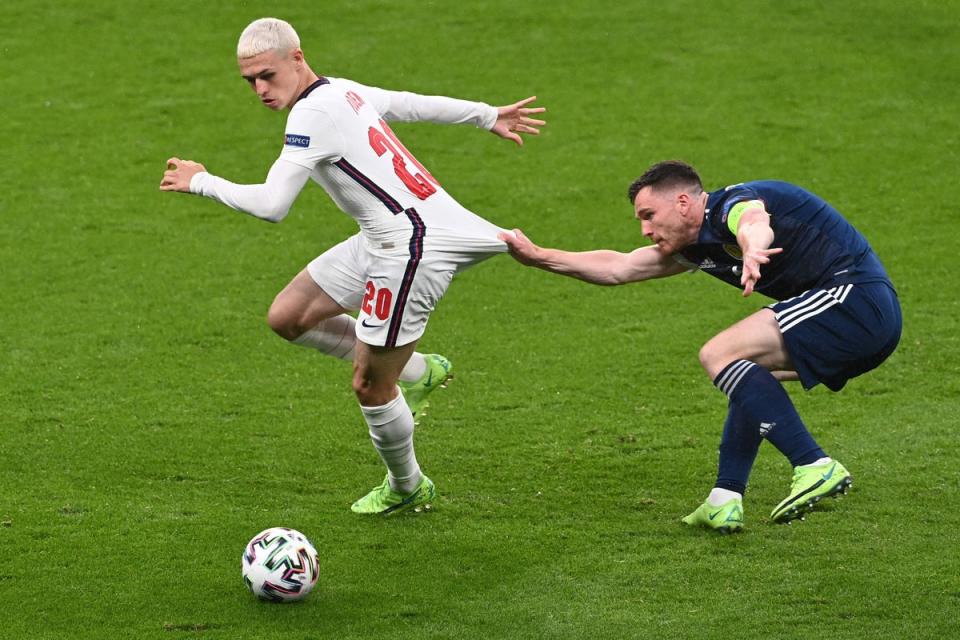Throwing a group-stage stinker is nothing new... England must prove they've got theirs out the way early

Having watched Germany embarrass Scotland on opening night, then Spain pick apart a decent opponent in Croatia in good style, there could be no denying that England’s 1-0 victory over Serbia — solid result though it was — felt a little underwhelming.
Context, though, has been kinder to Gareth Southgate in the days since, and his reminders about both the awkwardness and importance of the first group match of any tournament feel more vindicated now that Belgium have been beaten and Portugal and France made to work hard for their own opening victories, also by just a single goal.
“Today it’s not about assessing this game from the technical or tactical point of view,” said Portugal boss Roberto Martinez, after his team came from behind to beat Czech Republic 2-1 on Tuesday, an instruction that, assuming the Portuguese media and fanbase are anything like ours, will have fallen on deaf ears.
The question ahead of today’s Group C meeting with Denmark here in Frankfurt, then, is of where England’s campaign goes next.
It has been a theme of the past two tournaments under Southgate, and indeed many of those long before he took charge, that even in the course of relatively serene qualifications England tend to throw in a bit of a stinker somewhere to temper the mood.
It happened at the World Cup in Qatar, where a 6-2 thrashing of Iran sent expectations soaring ahead of the prime Friday-night clash with the USA, only for that game to… well, actually, can anyone remember anything about it at all?
It happened in similar circumstances during the last Euros, too, when the much-hyped Scotland derby finished goalless at Wembley in the pouring rain.

So, what have England done here? Got their off-night out of the way early and snuck away from it with three points as well? If so, they are tracking nicely, given the opening half-hour against Serbia featured more craft, more up-tempo passing, than in 180 minutes against the Scots and Americans combined.
Or will that second-game syndrome strike again this evening, against a Danish side hunting revenge for their semi-final defeat three years ago? If it does, the levels of scrutiny and dissection in the Serbia aftermath will soon feel quaint.
Southgate has spoken to his players this week about dealing with the forensic, individual analysis that inevitably comes with each England performance, though it is worth noting that it runs in terms of both the rough and the smooth.
True, Phil Foden will have had quieter games in a Manchester City shirt without sparking a noisy referendum on his best use, but Marc Guehi will also have played better for Crystal Palace without drawing anything like this week’s praise.
“There’s going to be a narrative about a player, a couple of players, after every England game,” said Southgate, whose squad includes a dozen tournament rookies.
“This is a different world to the one you experience at clubs. It’s very rare at their club that they’d win a game and experience what they’ve experienced here over the last couple of days.”
Those narratives move quickly at major tournament, not only out of amplified enthusiasm, interest and jeopardy, but also because they must. Conclusions probably should not be drawn after one match, but pretty much have to be after two.
If something — Trent Alexander-Arnold in midfield, for instance — does not quite convince on opening night, then it is almost always worth a second look. But with the perils of the knockout stage (or worse) looming, it takes a brave manager to sanction a third. This meeting with the Danes, then, will serve to confirm or dismiss the opinions formed hastily across this tournament’s first week, with little time or space for a great deal in between.
The exception is at left-back, where frustratingly for Southgate, nothing can change: Luke Shaw remains unfit and, while the lack of a left-footer is clearly harming England’s build-up play, Kieran Trippier is the obvious next-best.
After the relative unknown of Serbia, who England had never played at senior level previously, Kasper Hjulmand’s side ought to offer a more predictable yardstick against which Southgate might measure his. In the semi-final of Euro 2020, there was nothing between the teams in 90 minutes, and only the converted rebound of a controversially awarded, then saved, Harry Kane penalty to split them after extra-time.
“Losing a semi-final when we were so close and it was minor details that decided it, it took me a while to digest it,” Hjulmand said here yesterday. “I carried it for a while. That kind of game also gives you motivation.”
England need little extra, knowing that a second win in five days will guarantee their last-16 place with a game to spare, and possibly even wrap up top spot in the group.
Just as much, though, they need something a little more convincing, to leave their second-game syndrome behind.

 Yahoo Sport
Yahoo Sport 






































